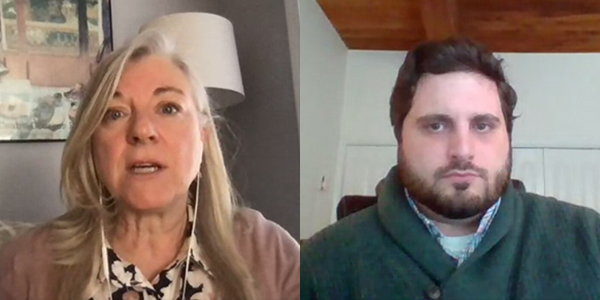This is not only “a big moment” for climate change but an “interesting” one as well, clean energy policy expert and podcaster Katherine Hamilton said Tuesday.
“Some of our muscles have atrophied a little bit, especially the ones around climate,” Hamilton said during the Connecticut Green Bank’s first webinar in a series focusing on “Promoting the Renewable Energy of Community.”
Hamilton, chair of lobbying firm 38 North Solutions and co-host of the popular “The Energy Gang” podcast, spoke about “Energy Trends and Transformations.” She explored the business and policy landscape for clean energy and technology and climate through the lens of RTOs, state and federal regulators and legislators, and the Biden administration.
Hamilton said that while there has been some federal engagement in renewable energy thanks to investment tax credits, the U.S. House of Representatives was “churning out a lot of legislation” that went nowhere during the Trump administration. Democrats now control the executive and legislative branches, which provides a sizeable and unexpected opportunity to enact comprehensive climate policy.
“We just didn’t think this moment would happen where you would have a president and a Senate and a House all aligned on the need to act quickly on climate,” she said.
Hamilton said the falling cost of clean energy coupled with strong grassroots support for significant climate change legislation tells her the country is in a “really different place.”
“There just wasn’t this groundswell of support from constituents” on climate change issues in 2009 when the Waxman-Markey bill to create a cap-and-trade system for greenhouse gas emissions passed the House and but never made it to the Senate floor.
“That has completely changed, and climate, because it’s in our faces, has become a voting issue, and I think that it really does change the dynamics on the hill and elsewhere,” Hamilton said.
While there have not been immediate moves on Capitol Hill, Biden acted swiftly to rejoin the Paris Agreement. He also appointed former Secretary of State John Kerry as a special presidential envoy on global climate action and Gina McCarthy, former EPA administrator during the Obama administration, as director of domestic climate policy. Former Michigan Gov. Jennifer Granholm was recently confirmed as secretary of energy. (See Granholm Confirmed by Bipartisan Vote.)
“This whole host of incredible people working throughout the administration, who understand the need to act quickly and who can all go in the same direction … organizing the entire federal government around solving for COVID, solving for jobs in the economy, solving for climate and solving for equity and racial injustice. Every single agency is going in that direction, and you can see that in everything that they do.”
On the legislative front, Hamilton said federal lawmakers are making progress on creating a national green bank. States like Connecticut, which founded the nation’s first green bank through legislation in 2011, are still leading the way working with private sector investors to create low-cost, long-term financing to maximize the use of public funds, she said. Projects in the state through fiscal year 2019 show that every $1 of public funds committed by the Green Bank yielded an additional $6 in private investment in the economy.
“Connecticut was the first mover on this, and it’s been able to prove this whole thing out,” Hamilton said.
Moderator Josh Ryor, director of utility programs and initiatives for the Connecticut Public Utilities Regulatory Authority, asked Hamilton what could be expected from FERC under Chair Richard Glick. She said his goal to prioritize transmission is “super important” so clean energy can move “from where it’s produced to where it’s needed.”
Hamilton said she thinks Glick will continue lowering barriers to new energy storage technologies. She noted former Chair Neil Chatterjee was instrumental in issuing orders 841 and 2222, which ensure that storage and distributed energy resources, respectively, have greater access to wholesale markets.
Hamilton also thinks Glick will work to ensure that wholesale markets better align with state policies. She was also acutely aware that New England states have held a series of online public technical forums in January and February on potential reforms at ISO-NE, ranging from wholesale market design to transmission planning to governance.



